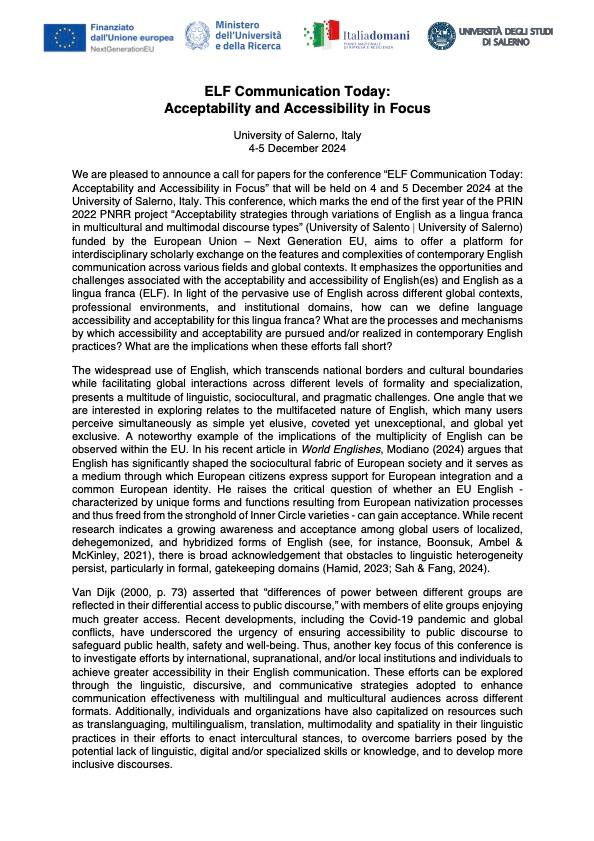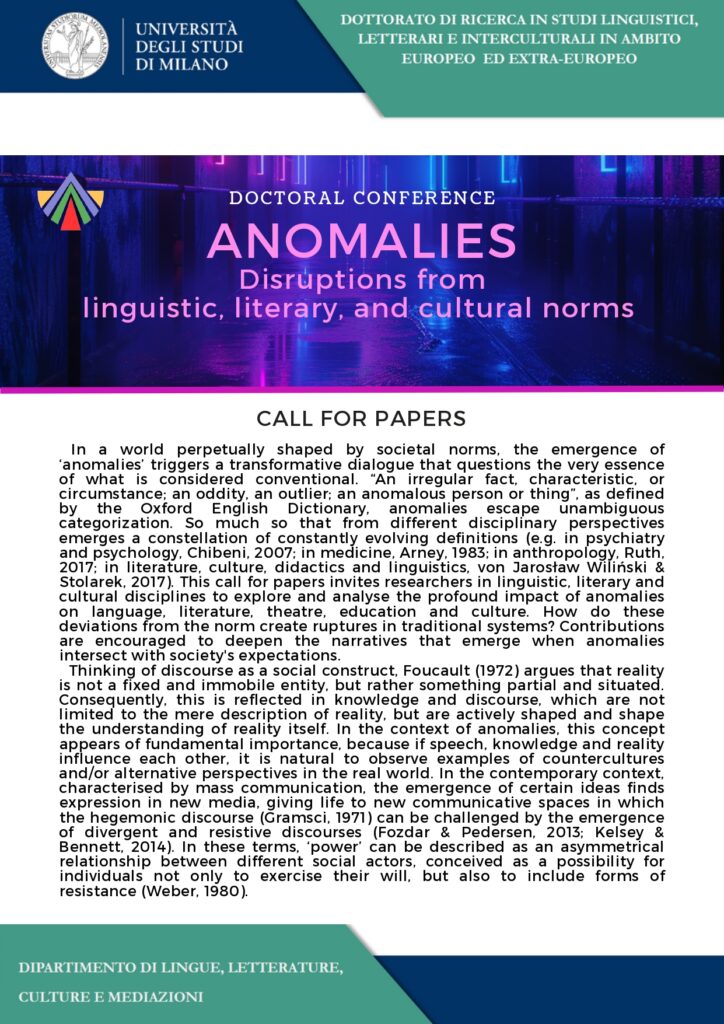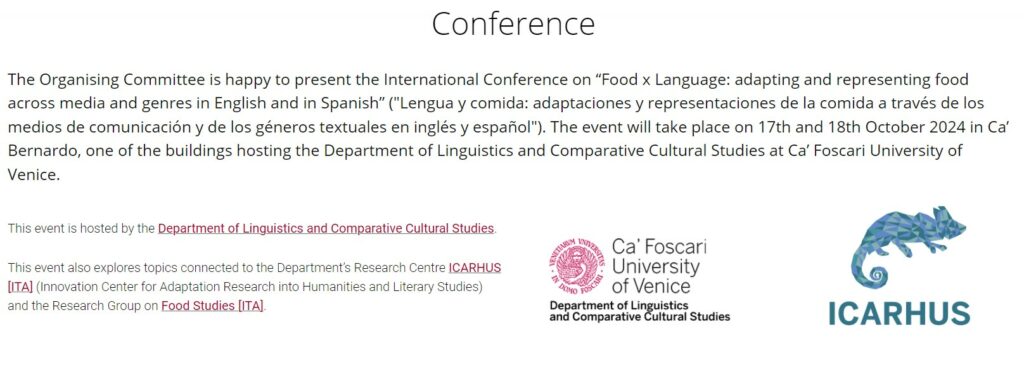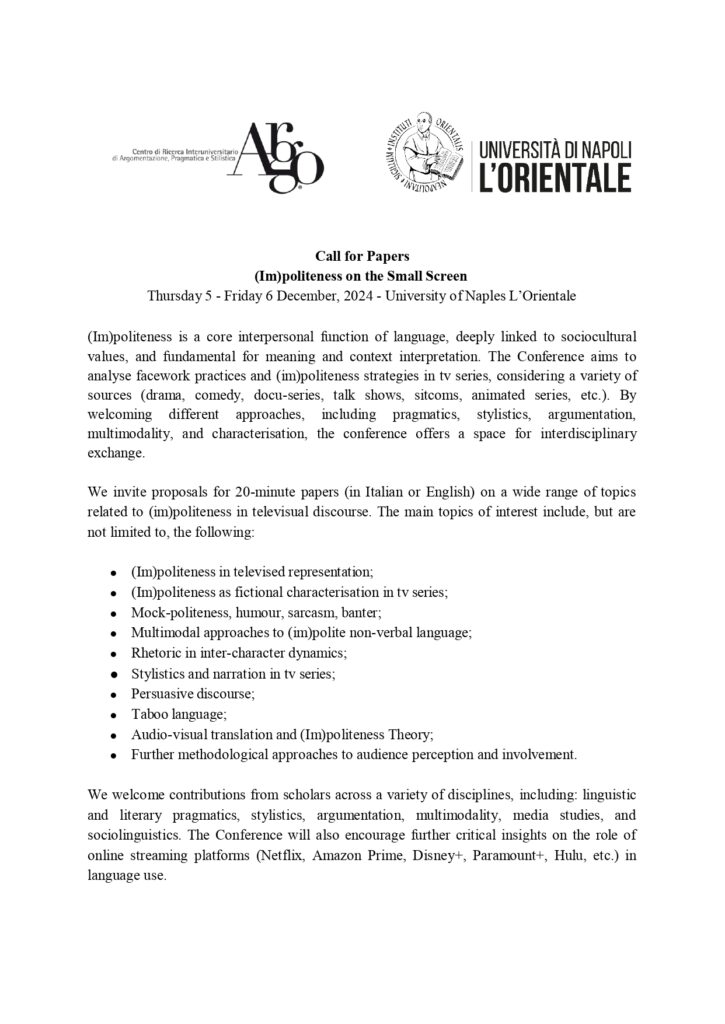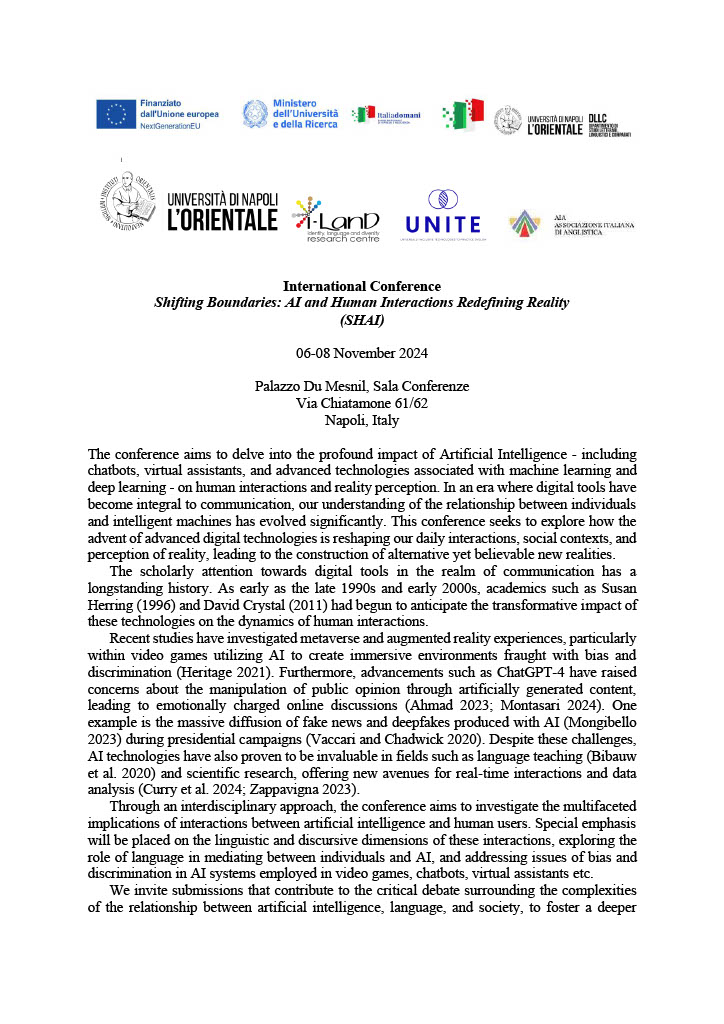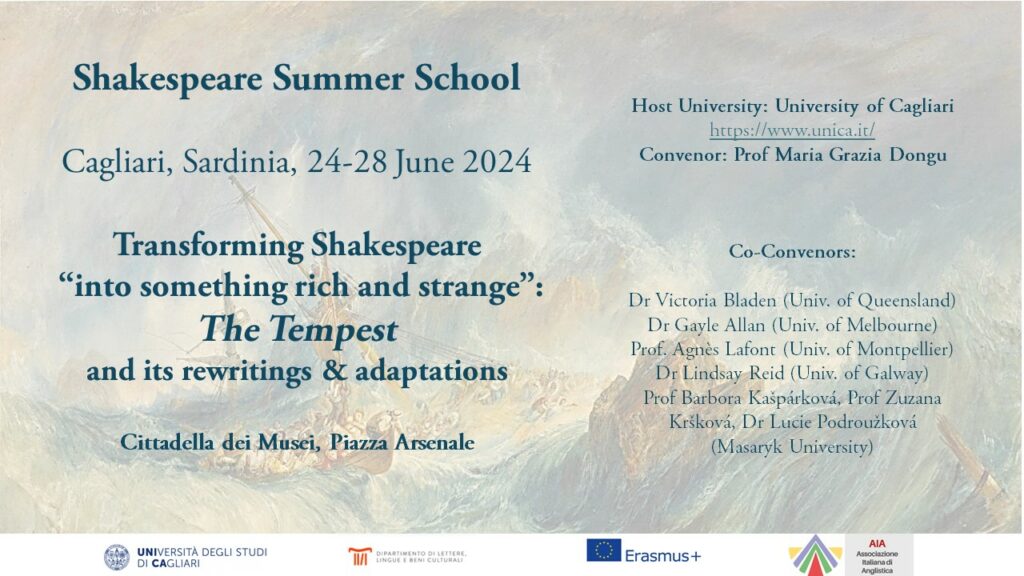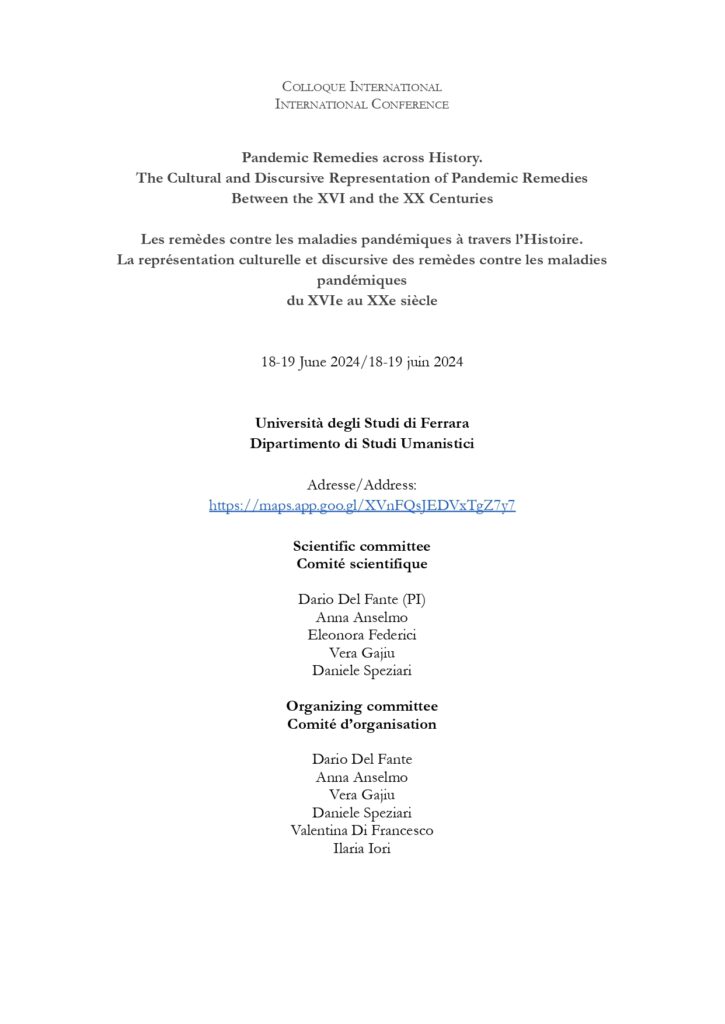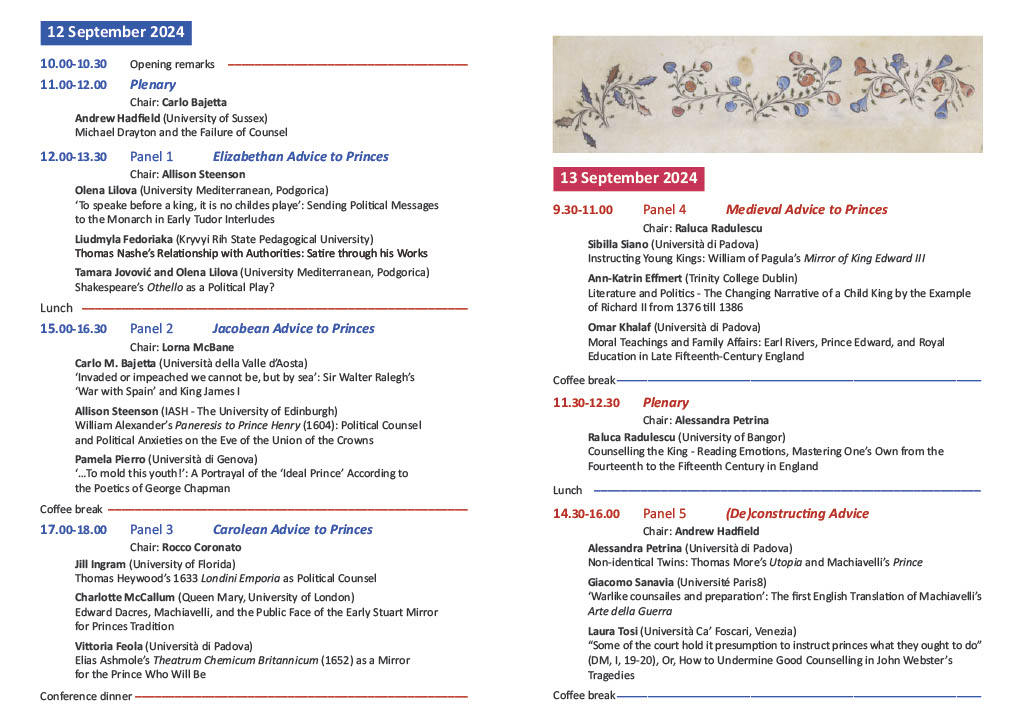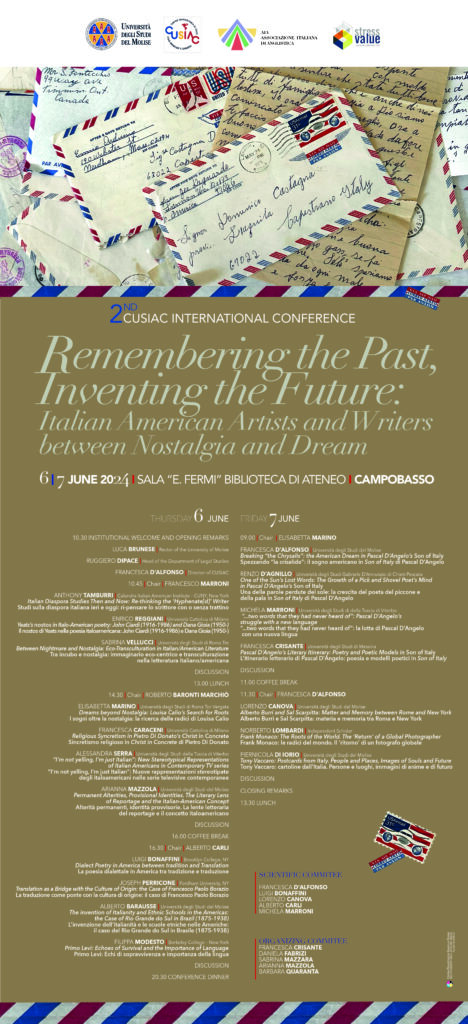***CALL FOR PAPERS***: ELF Communication Today: Acceptability and Accessibility in Focus
***CALL FOR PAPERS*** ELF Communication Today: Acceptability and Accessibility in Focus University of Salerno, Italy 4-5 December 2024 Abstracts of no more than 300 words and a brief bio should be sent to elf2024@unisa.it by 10 September 2024. Abstracts should clearly state the research question, methodology, (expected) findings, and implications. Important Dates: Deadline for abstract submission: 10 September 2024 Notification of abstract acceptance: 30 September 2024 Conference dates: 4-5 December 2024 We are pleased to announce a call for papers for the conference “ELF Communication Today: Acceptability and Accessibility in Focus” that will be held on 4 and 5 December 2024 at the University of Salerno, Italy. This conference, which marks the end of the first year of the PRIN 2022 PNRR project “Acceptability strategies through variations of English as a lingua franca in multicultural and multimodal discourse types” (University of Salento | University of Salerno) funded by the European Union – Next Generation EU, aims to offer a platform for interdisciplinary scholarly exchange on the features and complexities of contemporary English communication across various fields and global contexts. It emphasizes the opportunities and challenges associated with the acceptability and accessibility of English(es) and English as a lingua franca (ELF). In light of the pervasive use of English across different global contexts, professional environments, and institutional domains, how can we define language accessibility and acceptability for this lingua franca? What are the processes and mechanisms by which accessibility and acceptability are pursued and/or realized in contemporary English practices? What are the implications when these efforts fall short? The widespread use of English, which transcends national borders and cultural boundaries while facilitating global interactions across different levels of formality and specialization, presents a multitude of linguistic, sociocultural, and pragmatic challenges. One angle that we are interested in exploring relates to the multifaceted nature of English, which many users perceive simultaneously as simple yet elusive, coveted yet unexceptional, and global yet exclusive. A noteworthy example of the implications of the multiplicity of English can be observed within the EU. In his recent article in World Englishes, Modiano (2024) argues that English has significantly shaped the sociocultural fabric of European society and it serves as a medium through which European citizens express support for European integration and a common European identity. He raises the critical question of whether an EU English – characterized by unique forms and functions resulting from European nativization processes and thus freed from the stronghold of Inner Circle varieties – can gain acceptance. While recent research indicates a growing awareness and acceptance among global users of localized, dehegemonized, and hybridized forms of English (see, for instance, Boonsuk, Ambel & McKinley, 2021), there is broad acknowledgement that obstacles to linguistic heterogeneity persist, particularly in formal, gatekeeping domains (Hamid, 2023; Sah & Fang, 2024). Van Dijk (2000, p. 73) asserted that “differences of power between different groups are reflected in their differential access to public discourse,” with members of elite groups enjoying much greater access. Recent developments, including the Covid-19 pandemic and global conflicts, have underscored the urgency of ensuring accessibility to public discourse to safeguard public health, safety and well-being. Thus, another key focus of this conference is to investigate efforts by international, supranational, and/or local institutions and individuals to achieve greater accessibility in their English communication. These efforts can be explored through the linguistic, discursive, and communicative strategies adopted to enhance communication effectiveness with multilingual and multicultural audiences across different formats. Additionally, individuals and organizations have also capitalized on resources such as translanguaging, multilingualism, translation, multimodality and spatiality in their linguistic practices in their efforts to enact intercultural stances, to overcome barriers posed by the potential lack of linguistic, digital and/or specialized skills or knowledge, and to develop more inclusive discourses. We welcome submissions of empirical studies, theoretical contributions, case studies, and innovative research methodologies on the following topics: • Acceptability of ELF and Englishes • Adaptations to specialized content for non-specialized audiences • Attitudes towards English(es) and language ideologies • ELF and language ownership • ELF in academia • ELF in online communication • ELF in the dissemination of scientific knowledge and research • English(es) and European identity • Inclusivity initiatives and strategies in ELF-mediated interactions • Institutional uses of English • Linguistic hybridization and acceptability • Multilingualism, translanguaging and translation in today’s global communication • Multimodality and digital resources for the enhancement of ELF communication • Nativization and localization of English in the EU • Power and inequality in ELF interactions • Strategies for accessibility in crisis communication Join us for an engaging and thought-provoking conference as we explore the dynamics of the use of English as a lingua franca in today’s interconnected world. Local Conference Convenors Jacqueline Aiello, Rita Calabrese and Rossella Latorraca (University of Salerno) Scientific Committee Jacqueline Aiello (University of Salerno) Rita Calabrese (University of Salerno) Maria Grazia Guido (University of Salento) Pietro Luigi Iaia (University of Salento) Rossella Latorraca (University of Salerno) Mariarosaria Provenzano (University of Salento) References Boonsuk, Y., Ambel, E.A., & McKinley, J. (2021). Developing awareness of Global Englishes: Moving away from ‘native standards’ for Thai university ELT. System, 99, 102511. Hamid, M. O. (2023). English as a Southern language. Language in Society, 52(3), 409–432. doi:10.1017/S0047404522000069 Modiano, M. (2024). Identity and standards for English as a European Union lingua franca. World Englishes, 43, 210–227. https://doi.org/10.1111/weng.12646 Sah, P.K. & Fang, F. (2024), Decolonizing English-Medium Instruction in the Global South. TESOL Quarterly. https://doi.org/10.1002/tesq.3307 van Dijk, T. A. (2000). Discourse and Access. In R. Phillipson (Ed.). Rights to Language: Equity, Power, and Education. New York: Routledge.
***CALL FOR PAPERS***: ELF Communication Today: Acceptability and Accessibility in Focus Read More »

